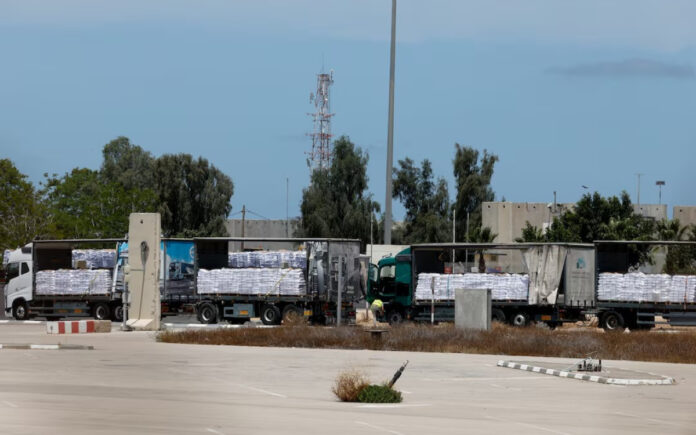Geneva/The United Nations: Despite Israel’s recent decision to allow limited humanitarian deliveries into Gaza following an 11-week blockade, the United Nations has confirmed that no aid has been distributed yet in the besieged Palestinian enclave, where famine risks are growing rapidly.
U.N. spokesperson Stephane Dujarric said that on Monday, four trucks carrying baby food were deposited on the Palestinian side of the Kerem Shalom border crossing. On Tuesday, a few dozen trucks carrying flour, medicine, nutrition supplies, and other essential items were allowed to enter.
“Israeli authorities are requiring us to offload supplies on the Palestinian side of Kerem Shalom crossing and reload them separately once they secure our team’s access from inside the Gaza Strip,” Dujarric told reporters.
“Today, one of our teams waited several hours for the Israeli green light to access the Kerem Shalom area and collect the nutrition supplies. Unfortunately, they were not able to bring those supplies into our warehouse,” he added.
Earlier Tuesday, a spokesperson for the U.N. humanitarian office in Geneva noted that Israel had granted permission for approximately 100 aid trucks to enter Gaza. However, logistical delays and security protocols appear to be hindering actual distribution.
U.N. aid chief Tom Fletcher described the initial volume of aid allowed by Israel as “a drop in the ocean,” underscoring the inadequacy of current efforts to meet Gaza’s urgent humanitarian needs.
Israel has declared its intent to expand military operations in Gaza and establish full control over the territory. The Israeli offensive, launched after Hamas’ cross-border assault on Israeli communities in October 2023, has left large parts of Gaza in ruins.
While Israel argues that its blockade is intended to prevent aid diversion by Palestinian militants, Hamas has rejected accusations of misappropriating supplies.
Also Read | Khamenei Rejects U.S. Demands as ‘Outrageous’ Amid Stalled Nuclear Talks
Meanwhile, a U.S.-backed group is preparing to launch operations in Gaza by the end of May, aiming to implement a new model for distributing humanitarian aid. However, the United Nations has criticized the initiative, citing concerns over impartiality and neutrality. As a result, it has declined to participate.
Health conditions in Gaza continue to deteriorate. Malnutrition rates have increased significantly under the blockade, with warnings that the situation may escalate further.
“I have data until end of April and it shows malnutrition on the rise,” said Akihiro Seita, UNRWA Director of Health, speaking in Geneva. “And then the worry is that if the current food shortage continues, it will exponentially increase, and then get beyond our control.”
The humanitarian crisis in Gaza remains dire, with growing urgency for effective and sustained aid delivery to prevent a full-scale famine.



